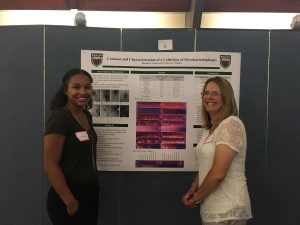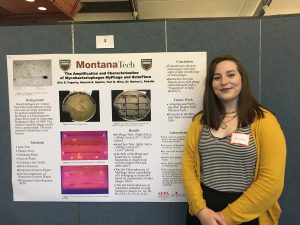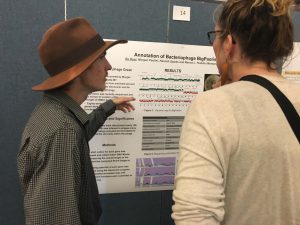PHAGES
Phages Helping Acquire Genuine Experiences in Science
PHAGES
Phages Helping Acquire Genuine Experiences in Science
BRIC (Bringing Research into the Classroom) is now PHAGES
Following the success of our “Bringing Research Into the Classroom (BRIC)” program at Montana Tech, PHAGES aims to continue this success with the following goals:
- Equip teachers with the knowledge, skills, and dispositions to provide high-quality bacteriophage-based research opportunities for students.
- Establish a sustainable pipeline for students into the sciences.
- Create self-sustaining satellite labs to ensure that students in underserved areas have access to local research opportunities. Select teacher leaders who have been involved with phage discovery in their classrooms for 4 or more years will serve as peer mentors to expand the project to their colleagues’ classrooms.
What is PHAGES?
Phagedigging Helping Acquire Genuine Experiences in Science provides training and mentoring to teacher leaders experienced with phage discovery in their classrooms and demonstrates a sustainable model for the >100 HHMI SEA-PHAGES faculty across the country to expand their reach to K-12 teachers and students.
What outcome will PHAGES have?
PHAGES teacher leaders gain the skills to independently prepare and deliver phagedigging for their own classrooms and mentor teacher colleagues to expand phagedigging to other classrooms, so that thousands of elementary through high school students can collect and test local soil and water samples and discover new bacteriophages. PHAGES students and teachers will engage in genuine research: citizen science bacteriophage discovery, and contribute to the known collection of bacteriophages.
The Bringing Research Into the Classroom (BRIC) project now known as PHAGES at Montana Tech in Butte, MT has been providing research experiences for Montana teachers and students since 2014. To date, BRIC/PHAGES has provided phage discovery to more than 8,000 students including some of Montana’s most remote communities.
Since 2014 the BRIC Program has:
Traveled
46,000 miles
Served
8,000+ Students
Discovered
19 Phages
Sequenced
8 Phages
Trained
28 Teachers
Citizen Science Phage Discovery in the Classrooms
Phages are viruses that infect bacteria and can be useful tools for fighting antibiotic-resistant bacteria. They are the most numerous biological entity on the planet. BRIC works directly with students in middle schools and high schools for 3-day phage discovery projects. Students and their teachers isolate phages from samples they collect from their local environment. If the students discover a phage, they choose a name the phage, and it is added to the database of phages at phagesdb.org. This three-day research experience engages students in relevant biomedical citizen science. From Dr. Pedulla’s outreach programs, combined, students have discovered over 100 new-to-science phages. All phages discovered in BRIC are included in the phagesdb.org database, ten have been sequenced and annotated, and 8 additional phage genomes are currently being sequenced.
Related News
New TEM Electron Microscope being used by PHAGES teachers – Oct. 2024 (click on video below)
Science classes take part in the PHAGES Project
CR Anderson students contribute to tuberculosis treatment research
TEM Electron Microscope
Video – Teachers Using Microscope
Pipeline Students Gallery
For six weeks over the summer students from PHAGES classrooms across Montana came to Montana Tech’s campus to participate in summer research where they had authentic experiences doing hands-on science in a lab setting. During their time on campus and in the lab, the students characterized and curated bacteriophages and presented their research and results at a symposium at the end of their program.
Teacher Academy Gallery
As part of the PHAGES program mentor and mentee teachers come to Montana Tech’s campus for a week-long teacher academy over the summer to improve on and learn new skills for using bacteriophage research in the classroom. This year teachers practiced lab techniques, learned how to perform genome annotations, discussed topics like vaccines and diversity in science, and created products to use with their students.
Teacher Instructions
Publishable Research
Characterization of a Bacterium Isolated from Hailstone in Butte, Montana
By: M. Lane and A. Walter: Submitted to Intermountain Journal of Sciences
Development of a Plaque Assay System for Streptococcus salivariuson BHI Agar
By: K. Walter: Submitted to Intermountain Journal of Sciences
SEPA → INBRE Biomedical Pipeline
Undergraduates:
Hannah Sparks, Montana Tech – INBRE Summer Undergraduate, Research Fellow
Autumn Lineback, Montana Tech—SEPA/INBRE Research Scholar*
*Former BRIC student at Billings West High School
High School Students:
Erin Fogarty, Butte High School/Montana Tech—SEPA/INBRE Research Scholar*
*Former BRIC student at Butte High School
Bo Rost, Baker High School/Montana Tech—SEPA/INBRE Research Scholar*
*Former BRIC student at Baker High School
Kenna White, Butte High School/Montana State University—SEPA/INBRE Research Scholar




